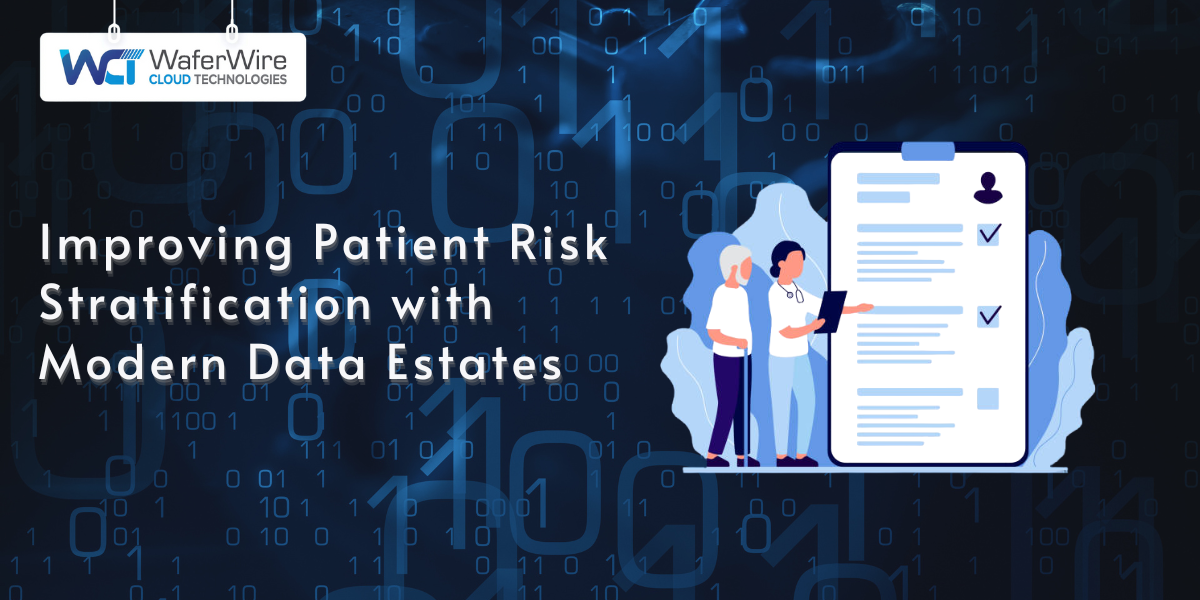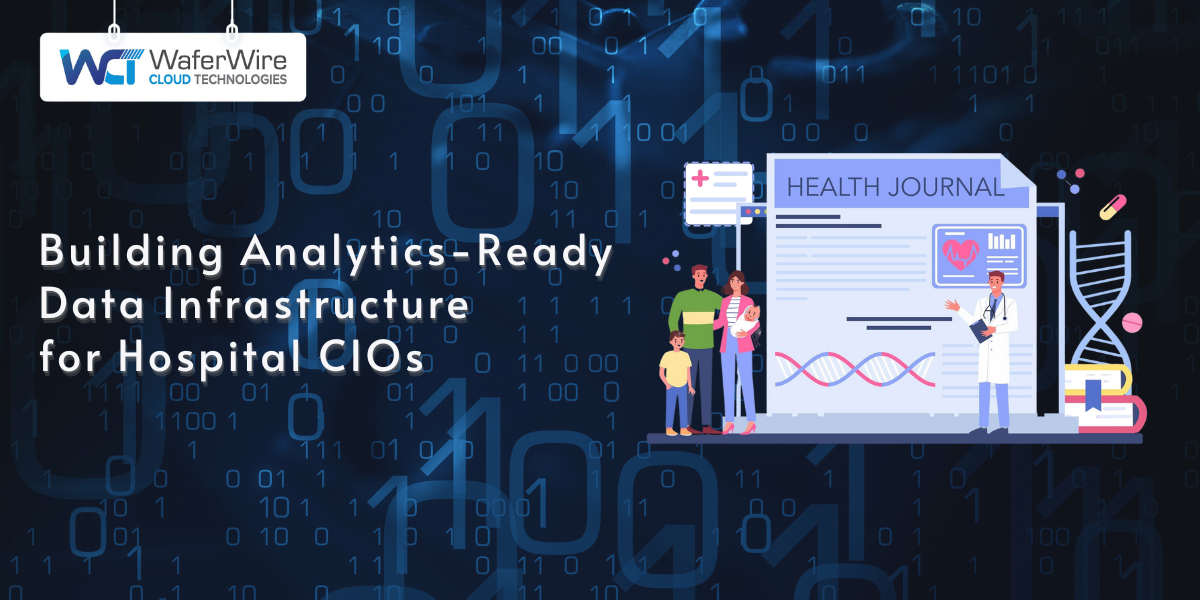
Azure Cloud Modernization Strategies for the Future
Surya V
2025-03-31
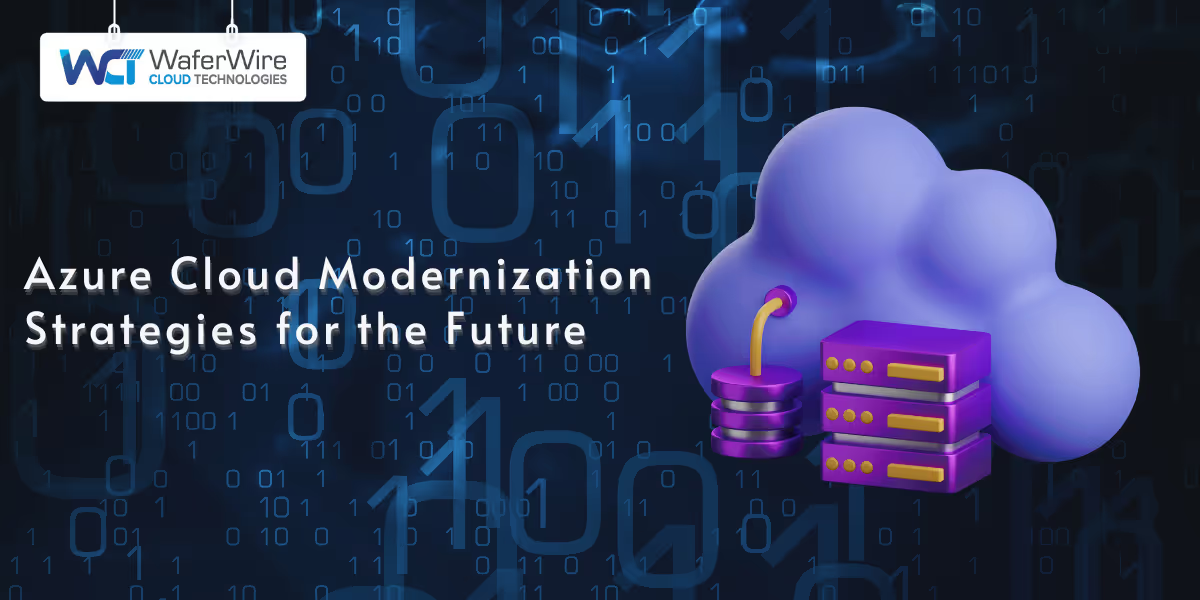
Talk to our cloud experts
Subject tags
Cloud modernization is emerging as a crucial factor for businesses looking to generate new revenue and secure a competitive advantage. Microsoft Azure enables organizations to convert their cloud infrastructure into a powerful growth engine, blending scalability, security, and advanced innovations to drive long-term success. Beyond just cost savings, Azure empowers businesses to turn their cloud investments into profitable ventures and optimize resources.
A well-executed Azure cloud modernization strategy enables businesses to maximize ROI and leverage the full potential of their cloud capabilities to create sustainable, scalable revenue opportunities.
In this blog, we will explore actionable Azure cloud modernization strategies and provide insights into how businesses can harness the power of the cloud to drive growth.
What is Cloud Modernization?
Cloud modernization is the process of updating and transforming an organization’s existing IT infrastructure, applications, and data to align with the latest cloud technologies. This approach involves migrating or adapting traditional systems to leverage the power of cloud platforms, optimizing them for scalability, efficiency, and innovation.
The goal of cloud modernization is to improve operational performance, streamline processes, and enhance customer experiences. By embracing cloud solutions, businesses can accelerate their time-to-market, enabling them to deliver new products and services faster and more effectively.
Now let’s explore why this transformation is not just beneficial but essential for staying competitive
Importance of Cloud Modernization
Cloud modernization allows businesses to streamline their operations and eliminate the limitations of outdated technology. Moving to the cloud means better adaptability to market changes, faster time-to-market, and access to advanced tools that drive innovation.
By embracing Azure data modernization, organizations can reduce operational inefficiencies, lower maintenance costs, and enhance overall system performance. The shift from legacy systems to the cloud supports quicker data processing, higher uptime, and more reliable service delivery.
This transformation helps businesses remain resilient by adapting to shifts in customer expectations and business needs. Whether integrating artificial intelligence, automating manual processes, or gaining real-time insights, cloud modernization empowers organizations to stay relevant and deliver value faster than ever.
With a clear understanding of the importance of cloud modernization, it’s time to dive into the specific tools and solutions that Azure offers to turn this transformation into reality.
Cloud Modernization Solutions with Azure
As part of a successful cloud modernization strategy, Azure provides several powerful tools that enable businesses to streamline operations, optimize data management, and enhance decision-making across their organizations. Below are some of the key ways businesses can transform their operations with Azure:
Utilizing Azure Platforms for Machine Learning, Analytics, and Data Lakes
Azure provides robust platforms for machine learning and advanced analytics, enabling businesses to extract valuable insights from their data. Organizations can build scalable data lakes to store vast amounts of structured and unstructured data. With Azure data modernization, enterprises like retail or manufacturing can leverage AI-powered analytics to predict customer behaviors or optimize supply chains, improving efficiency and decision-making.
Azure SQL for Modern Database Management
Azure SQL offers a fully managed cloud database service that simplifies database management. Businesses can modernize their database environments by transitioning to Azure SQL, which provides automatic scaling, high availability, and security features. For financial services or retail companies dealing with high transaction volumes, this solution ensures optimal performance without the complexity of managing infrastructure. By modernizing databases with Azure SQL, organizations can improve reliability, reduce costs, and enhance performance.
Azure Cosmos DB for Handling Diverse Data Formats and Global Replication
Azure Cosmos DB is a globally distributed, multi-model database that handles different data formats and supports low-latency access across regions. It’s ideal for businesses that need to manage data from multiple sources, whether it’s e-commerce, IoT, or real-time analytics. With Azure data modernization, companies in any industry can use Cosmos DB to replicate data globally and ensure a seamless customer experience, no matter where they are.
After observing the potent modernization tools that Azure provides, let’s investigate how companies can use these solutions to modernize their enterprise applications and maintain a competitive edge.
Modernizing Enterprise Applications
Businesses can transform their software architecture and transition from inflexible frameworks to flexible, cloud-based answers by utilizing services such as Azure App Service and Azure Kubernetes Service. Below are the key strategies businesses can use to modernize their enterprise applications with Azure:
Using Azure App Service and Azure Spring Cloud for App Modernization
Azure App Service and Azure Spring Cloud provide powerful platforms for modernizing enterprise applications. These services simplify the migration and management of web applications, ensuring they run smoothly in the cloud. Businesses can deploy applications faster, scale seamlessly, and maintain high availability with minimal downtime.
Benefits of Microservices Architecture in Building Scalable Applications
Microservices architecture plays a crucial role in modernizing enterprise applications. Businesses can increase flexibility, improve scalability, and reduce downtime by breaking down large, monolithic applications into smaller, manageable services. This is particularly useful for companies in industries like retail or manufacturing that experience fluctuating demand and need to scale their systems quickly.
Containerizing .NET and Java Apps Using Azure Kubernetes Service (AKS)
Azure Kubernetes Service (AKS) enables businesses to containerize and orchestrate .NET and Java applications, modernizing their application infrastructure. By converting legacy applications into containers, organizations can achieve greater portability, consistency, and scalability across different environments.
After modernizing enterprise applications, it’s essential to focus on data modernization. This next step ensures businesses can fully leverage the power of cloud technology for optimized performance, advanced analytics, and greater decision-making capabilities.
Benefits of Data Modernization
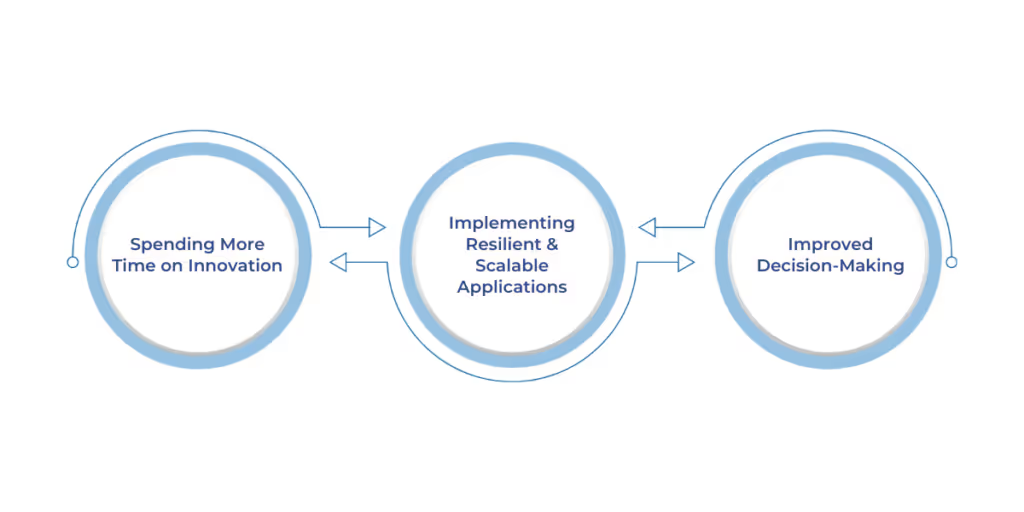
By shifting to Azure data modernization, businesses can unlock new levels of efficiency, flexibility, and scalability.
Spending More Time on Innovation
One significant advantage of Azure data modernization is the ability to allocate more time and resources to innovation rather than maintaining outdated systems. Cloud-native technologies simplify infrastructure management, allowing businesses to focus on developing new products or services.
Implementing Resilient and Scalable Applications
Applications modernized on the cloud offer businesses the flexibility to scale easily. With Azure data modernization, companies can deploy applications that handle sudden increases in demand without compromising performance.
Improved Decision-Making
Modernizing your data systems with Azure data modernization enhances decision-making accuracy and speed. Cloud platforms like Azure Synapse Analytics enable businesses to access real-time, actionable insights that improve strategic planning.
Having explored the benefits of data modernization, the next step is examining the tools that can help businesses migrate and modernize effectively. Let’s look at the essential migration and modernization tools available with Azure.
Migration and Modernization Tools
Azure offers a suite of powerful tools designed specifically to simplify data integration, improve analytics, and streamline data management—critical elements for successful cloud transformation.
Azure Data Factory
Azure Data Factory is a key tool for businesses looking to integrate data from various sources efficiently. By enabling ETL (Extract, Transform, Load) processes, it helps organizations manage large-scale data workflows seamlessly. With real-time data integration capabilities, companies can ensure data consistency and accuracy across all systems. Whether it’s integrating customer data or operational metrics from multiple platforms, Azure Data Factory ensures data flows seamlessly, helping businesses make quick, informed decisions.
Azure Synapse Analytics
For businesses aiming to enhance their decision-making capabilities, Azure Synapse Analytics provides a unified experience for ingesting, preparing, managing, and serving data. With the ability to integrate data warehousing and big data analytics, Synapse empowers businesses to run advanced analytics and gain actionable insights in real time. Whether you're in retail, manufacturing, or finance, Azure Synapse Analytics helps unlock the power of data to make smarter, faster decisions, driving growth and efficiency.
Azure Data Lake Storage
As data continues to grow, so does the need for scalable and secure storage solutions. Azure Data Lake Storage allows businesses to manage massive volumes of structured and unstructured data. With its high-performance, safe, and cost-effective infrastructure, Azure Data Lake Storage supports the seamless management of data across multiple environments, from operational data to analytics data. This allows businesses to store, manage, and analyze data in a central location, enhancing accessibility and ensuring consistent, real-time access to the information needed for strategic decisions.
Selecting the optimal approach for your data modernization journey ensures long-term success and seamless integration. Let’s dive into developing a strategy that aligns with your business goals and drives measurable outcomes.
Choosing the Right Strategy for Cloud Migration
The right strategy minimizes risks, maximizes benefits, and lays the foundation for future growth.
Developing a Comprehensive Cloud Migration Strategy
A successful migration strategy requires a deep understanding of the organization's current infrastructure, business needs, and future goals. Azure data modernization allows companies to move systems, applications, and workloads to the cloud in a structured and seamless way.
Aligning Modernization Efforts with Business Outcomes
Modernization is not just about adopting new technologies—it’s about achieving tangible business outcomes. Aligning Azure data modernization efforts with business goals ensures the organization achieves measurable improvements.
Maintaining Governance and Management Practices
With the shift to cloud technologies, maintaining strong governance and management practices is essential. Proper governance ensures that data is protected, systems are compliant, and resources are used efficiently. Azure data modernization offers tools to manage permissions, track usage, and maintain security across applications.
The methods for a successful cloud migration have been described; now let’s examine the important factors and difficulties that companies encounter when modernizing.
Key Considerations and Challenges
These hurdles involve organizational, operational, and legal factors. Addressing these challenges requires a strategic approach prioritizing seamless integration and alignment with business objectives.
Addressing Organizational Challenges and Cultural Shifts
Modernizing technology requires a shift in infrastructure and company culture. Legacy systems often have entrenched workflows, and employees may be accustomed to existing processes. Transitioning to Azure data modernization requires building a culture of flexibility and adaptability.
This often means investing in training, reskilling teams, and shifting mindsets to embrace cloud technologies. Leadership must set the tone for this change by demonstrating the benefits of modernization and ensuring that employees have the support they need to adjust to new tools and processes.
Ensuring Legal Compliance and Privacy Concerns
Migrating to the cloud ensures that data remains secure, private, and compliant with applicable laws. Whether dealing with customer information, financial records, or sensitive healthcare data, businesses must consider data privacy regulations like GDPR, HIPAA, or other industry-specific guidelines. Azure data modernization offers a robust framework for securing data.
Still, companies must work closely with legal and compliance teams to ensure data is handled appropriately throughout the migration process. Any lapse in compliance could result in legal consequences and damage to customer trust, making it critical to have clear governance and security measures in place.
Managing Operational Costs and Minimizing Downtime
Cost management is a common concern during the migration to cloud-based systems. While Azure data modernization can lead to cost savings over time, businesses must carefully plan the migration process to avoid overspending or unexpected costs. This includes budgeting for the upfront investment in cloud services and the resources required for a successful migration. Minimizing downtime during the migration process is also key.
A well-organized approach, such as migrating in phases or using hybrid cloud models, can help ensure critical systems remain operational while transitioning. Businesses can prevent financial strain and ensure a smooth transition by clearly focusing on cost optimization and operational continuity.
Conclusion
Embracing cloud technologies like Azure allows businesses to move faster, make smarter decisions, and meet customer demands more efficiently. Businesses that embrace Azure data modernization are putting themselves in a position for long-term growth rather than merely updating their technology. It all comes down to cost-effectiveness, scalability, and having the flexibility to adapt to the constantly shifting market. It can use Azure to streamline operations, boost innovation, and realize the potential to upend entire industries.
WaferWire is the partner you need to make this transition seamless. Whether you’re in retail, manufacturing, or financial services, their deep expertise in Azure data modernization ensures you don’t just keep up with the trends—you set them. From strategy to execution, we provide the full package. Our tailored solutions help businesses transform quickly and efficiently, driving real, measurable results. Take control of your digital transformation now with Azure data modernization and secure your spot at the top. Reach out to us.
Subscribe to Our Newsletter
Get instant updates in your email without missing any news
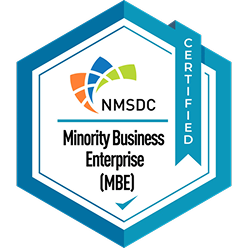
Copyright © 2025 WaferWire Cloud Technologies




.png)








